By Tegan Shockley September 25, 2020
Ministries undertake the issue of sexuality, revealing how the religion has hurt and isolated believers.
I grew up going to church on Sundays like most people in the Bible Belt. Maybe not so normal, I put my faith in Jesus after God asked me in a dream, “Tegan, are you ready?”
I think my life is pretty normal for a small-town Missouri girl though. I played sports in high school. My boyfriend and I won prom king and queen. I watched my brother marry his high-school sweetheart. I have a loving family that supports me.
Moving to the University of Arkansas for college presented some new challenges. How strong was my faith? Could I make a long-distance relationship work? Would I be able to make new friends?
What really sucks is being away from my boyfriend. We started dating our senior year in 2016 and spent almost every day together. After we went long distance, we started sleeping over at each other’s dorms during visits.
I would lie to my parents about staying with a girl friend. There was something exciting about being sneaky, but a tinge of guilt always rang in the back of my head. Numerous religions have propagated the idea that women need to be pure. Virgin. Men don’t want a wife who’s engaged in sexuality activity. It was popular in the ‘90s for symbols like purity rings to grace young girls’ fingers across the U.S.
It was very clear to me that sex was off the table. Since I’ve been with my boyfriend, a gloomy thought has made residence in my mind and reappears every so often. What if I don’t end up marrying him? I’d have to explain things we did with my husband. With a vague understanding of sexuality from the church, guilt set in.
It’s easy to get caught up in exploring sexuality with someone you care about. It’s easy to push boundaries in a relationship because the Bible isn’t very clear about dating. It’s easy to justify those actions when you miss your boyfriend who lives 160 miles away.
The blurred lines of dating as a Christian led me to do things that I feel guilty about. How far is too far? I haven’t had sex, but it doesn’t mean I haven’t been sexually active. Fortunately, I haven’t felt isolated by church. In part, that’s because of Emma Rippelmeyer, 25, a mentor from my small group through Fellowship Bible Church.
When Emma said she was leading a seven-week study based on the book Rethinking Sexuality by Juli Slattery during my sophomore year at the University of Arkansas, I was all in. I had been feeling guilty about stuff I was doing with my boyfriend. The idea of getting clarity about dating drew me in. This isn’t a topic my family ever really talks about, so I was intrigued. I wasn’t aware of studies that dealt with issues around sex.
More and more Christian ministries are tackling the issue of sexuality. Generations of believers have been hurt by the religion’s narrow view or the culture’s perspective of sexuality, driving some people away. A 2015 Pew Research Center study estimated 106 million Christians are projected to leave, while only 40 million will switch to the religion globally by 2050.
Faith-based organizations are looking to the Bible to rectify that pain. Christians are moving away from the purity movement and the “just don’t do it” or “because God said so” adages. They focus on open communication about God’s design for sexuality and provide resources for people who struggle with specific issues, like pornography and the addiction to it.
My group met for a few weeks and studied Slattery’s book while working through passages in the Bible like Romans, Deuteronomy, Ephesians and Luke. We covered topics on sexual discipleship, sexual brokenness, sexual wholeness and more. The group is based on a ministry, which is a religious organization focused on a specific subject that serves people.
The ministry is Authentic Intimacy, with the goal of “reclaiming God’s design for intimacy and sexuality.” It is used across the U.S. and in places around the world like Europe and Africa, said Kristi Miller, the business manager. She sets up training seminars for church leaders and other events for Slattery to speak at, like Family Life’s Love Like You Mean It Marriage Cruise. The organization provides podcasts, studies and books, like Rethinking Sexuality, on multiple topics. There are other groups like it.
Authentic Manhood is another ministry that deals with sexuality. Its message focuses on equipping men to live Gospel-centered, passionate and purposeful lives. One resource it provides is 33 the Series, which has been sold to 1 million men all over the globe, said Tierce Green, a teacher for AM in Texas.
“When I was a teenager growing up in church,” Green, 65, said, “it really seemed like sex was this evil thing. Like, ‘Don’t kiss anybody or you’ll go blind …’ but really the foundation is that sex is a good thing. God created it.”
These ministries believe two things: God designed sexuality, and people are sexually broken. Sexual sins seem to carry a heavier weight than others, so people can feel shunned by the church. Sexuality in general is traditionally not a subject that’s talked about in Christian churches either, especially outside the context of marriage. Instead of staying silent on sexuality, the church needs to talk about these issues so people don’t feel rejected for sins.
EMMA
She sat in the back ring of the circle, trying not to move at a friend’s house in Fayetteville, Arkansas in 2016. She didn’t want to draw attention to herself. Emma Rippelmeyer, 22 at the time, rested her hand on her face so she could quickly wipe the tears away. The women in her Christian community group just levied some well-meaning, but devastating advice about sex in marriage.
The Rippelmeyers got married in June of 2016. After the honeymoon phase quickly dissipated, their sexual relationship became shaky, mainly for Emma. The group told her that to some degree, a wife is responsible for the sexual wholeness of her husband. If she isn’t available for her spouse, that will lead to sexual sin like pornography or an affair. The response sent Emma further down a spiral.

Confetti falls on Josiah and Emma Rippelmeyer as they leave their wedding for their honeymoon June 12, 2016. They help lead a small group for college students through Fellowship Bible Church in Fayetteville, Arkansas. Courtesy of Emma Rippelmeyer.
So now it’s her fault if the marriage falls apart because she’s not “serving him?”
Emma had finally brought up her struggle because the group of mostly married people separated into men and women. Surely some of them would’ve understood what she was feeling and alleviate some of her anxiety. Instead, she left that night crushed by shame’s heavy weight.
She waited until marriage for sex, but it was emotionally and physically painful for Emma. Although she trusted her husband, Josiah, more than anyone else, Emma began feeling anxious around him in the bedroom. For months prior to that community night, she locked the bathroom door and sat on the floor crying by herself with no idea why. She hated when people saw her cry.
“I was having deep emotional stress, anxiety and depression all around sex,” Emma said. “The rest of our marriage was super fun, which is another reason it was confusing … but this one piece was just a disaster.”
Emma didn’t know who to turn to as the first married person in her close friend group. She couldn’t talk to her family either.
Growing up in southern Texas, she never got in-depth conversations about sexuality from her church or her parents. Emma thinks her mom and dad are wonderful, but they didn’t equip her well. Her upbringing of silence led to a marriage full of anxiety and fear about sex.
“I just felt really alone,” Emma said. “I became very unavailable, emotionally and physically with my husband. Then I thought, ‘This is going downhill really quick, I need to figure out some advice.’”
JOY
It was fall 2011, her freshman year at the University of South Florida in Tampa. Joy Skarka, 18, entered college thinking she had to be a perfect Christian. Though young, she was looking for love after always being left empty in previous relationships.
Joy attended orientation in August, like most incoming undergraduates do before classes begin. Then on the third day of being on campus, Joy spotted an attractive boy.
She didn’t really know anyone there after moving from Monroeville, Pennsylvania, so Joy thought she was lucky to meet someone so early on. He seemed different than the boys she dated in high school. Sweet and trustworthy. She walked back with him to his dorm to hang out. Instead, he raped Joy.
She wasn’t drunk at a party. She wasn’t alone in a dark alley. Was this her fault for choosing to go to his place?
A couple months passed before Joy mentioned what happened to anyone. Her friends back in Monroeville knew something was wrong, so when she opened up, they assured her that it wasn’t her fault.
But did God care about her? Anger swelled as she questioned why God would let this happen. Shame became her constant companion: this is a punishment from God. You deserved it. You’ll never earn God’s love.
JONATHAN
Everything changed for Jonathan Daugherty, 46, on a Tuesday in August of 1999. He finally confessed everything to his wife.
He was a porn addict, went to strip clubs, slept with prostitutes and had multiple affairs. He revealed all of it.
He was first introduced to porn when he was 12 years old. A friend came over and unexpectedly showed Jonathan pornography. It was traumatic because his family never talked about anything sexual. But there was something alluring about the pictures too. This set him on the path of leading a double life.
“Eventually I got married,” said Jonathan, who lives in San Antonio, Texas, “and in my mind, (in) my Christian upbringing, you get married and that’s when all these problems go away … Sadly though, I learned the hard way that you bring into your marriage whatever is already broken.”
Even after sharing his darkest secrets, Jonathan went to be with another woman later that Saturday. When he came home, his wife’s bags were packed. Jonathan watched her drive away, headed to her parents as he walked into their house all alone.
He was faced with two options: keep doing what he was doing and end up dead or go back to the God he grew up with.
“I had thought about suicide several times in the year prior to my wife leaving, even to the point where I’d sat on the end of our bed with a loaded gun in my hand,” Jonathan said. “I had a profound experience with God’s grace that day.”
EMMA
After two failed attempts of asking for marital advice, in late 2016 Emma Rippelmeyer contacted Kim Vollendorf, a Christian author she heard speak about sex on campus at the University of Arkansas. Emma no longer felt crazy.
“I am forever thankful for Kim because she was the first woman to speak of sex as God intended it,” Emma said. “He made it, so he has authority over it, not the culture.”
Emma didn’t grow up talking about sex. She didn’t know how to express herself sexually in marriage, so everything felt hidden and shameful.
Young girls all over the country were told the same narrative Emma received growing up during the purity movement: Your body is a rose. Every time you sexually interact with someone, you give a piece of yourself away and lose a petal.

Emma helps set up an arbor for a wedding July 3, 2018. She previously worked part time at Fellowship Bible Church, but now runs her floral business Stems By Em full time. Courtesy of Emma Rippelmeyer.
Maybe because she partook in sexual sin with her high school boyfriend, God was punishing her. No one wants a rose that lost its petals.
“I guess I’ll just have a really crappy sex life now,” Emma said. “I would get really mad at my own body for not reacting how I wanted it to.”
Although she didn’t have a stigma against counseling (her father was a counselor), the idea of talking about her problems felt worse than pulling teeth. Josiah had been suggesting they go to couple’s therapy, but Emma finally consented after Kim brought it up.
Emma slowly started getting better. Some sessions she would be with Josiah. Other times Emma was by herself, where she learned that her emotions need to be in a good place before having sex. With a helpful community, counseling and a husband who wouldn’t give up her, Emma’s sexual brokenness started healing.
“I had very few Jesus narratives about sexuality,” Emma said. “You can dig past what the Christian culture has to say about sexuality and get to what Jesus says. It’s really beautiful, and it’s really redemptive and it’s really forgiving.”
For her, Joel 2:25 is a verse she keeps close to heart: “I will restore to you the years that the swarming locust has eaten, the hopper, the destroyer, and the cutter, my great army, which I sent among you.” Emma believes God will heal her pain.
JOY
It wasn’t her fault. Joy needed to process that thought. But it was difficult. It took time before she decided to report the rape later that fall semester, opting to go through the university’s system. She had to tell her story over and over again, reliving her trauma.
In the middle of a random classroom on campus, Skarka was separated with a manmade divider, just a few feet away from her rapist. Joy’s representative from the school sat with her on the right. Three officials were in front acting as the judges. She had to recount that day, knowing he was right there. Joy got to leave before he argued his side.
During Christmas break of 2011, Joy got the news. The university believed her and kicked the student off campus.
“After going through it … I know why most women don’t tell anyone,” Joy said. “It wasn’t until that call where I think healing could finally begin.”
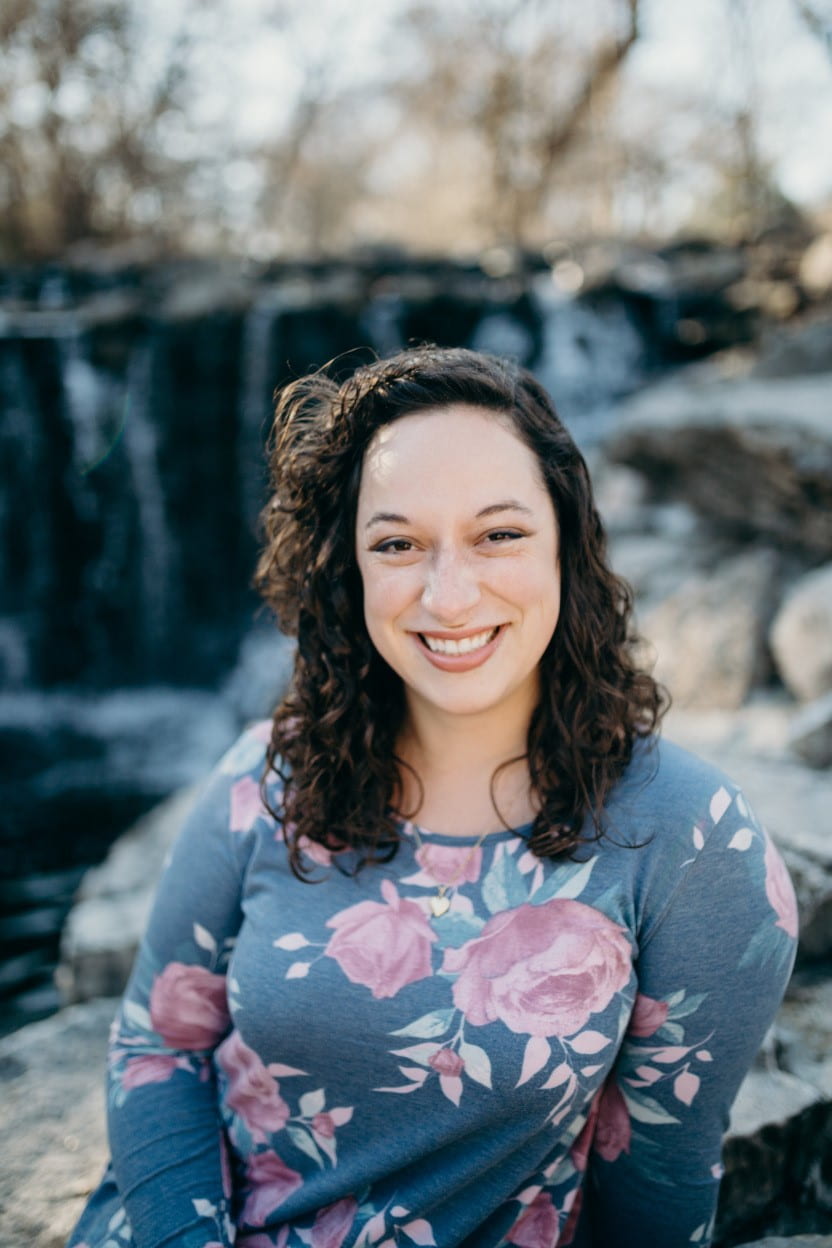
Joy Pedrow Skarka runs a blog bearing her name to help bring women to Jesus. She offers resources on singleness, dating, sexual addiction or abuse, and being in college. Courtesy of Joy Skarka.
For the first year after she was raped, Joy was depressed and turned to porn for comfort. She first saw pornography in fifth grade. A friend came over and showed a video on her computer. At the time, Joy didn’t know what it was, but felt the need to hide it from her parents.
“I grew up in a closed family system,” Skarka, 27, said. “We put conflict under the rug. So, I just had all these questions, ‘What is sex really like? Like (the rape) wasn’t sex, what happened?’ I started Googling questions, which led to pornography.”
Healing didn’t come quickly for Joy. For months, she would go to class and immediately return to her room to lay in bed and cry. On the desk near her bed, Joy noticed the Bible her hometown church gave her. She thought that there must be something in it that could be helpful.
“I was asking God like, ‘I don’t understand, I don’t know anything, but can you just please comfort me and bring healing?” Joy said.
Then one day another college student from her dorm floor invited Joy to an event with Cru, a Christian organization primarily for university students across the U.S. Joy heard a message of God’s grace. It was the first time she understood God’s love is a free gift.
With the help of a Cru mentor, Joy worked through her abuse and stopped looking at pornography and masturbating. She rededicated her life to Christ and got baptized at Aletheia Church in Tampa her sophomore year.
Joy launched a website in 2013 to share her story and create resources for women. Through the trauma, she found a passion for women’s ministry.
JONATHAN
For nine months, Jonathan was separated from his wife Elaine. That day in 1999 revealed he was powerless, and he hit rock bottom.
“(Her leaving) was actually the catalyst that pushed me into recovery,” Daugherty said. “It also pushed me back towards God.”
He grew up looking at sexuality through a purity narrative. You weren’t supposed to have sexual feelings as a single person. You never discussed what it meant to be a sexual being. Sexuality was reserved for marriage.
“A lot of my confusion and frustration came around growing up in that environment,” Jonathan said. “I didn’t have any outlet for even having a conversation about urges and feelings that I have related to being a sexual being.”
The first step Jonathan took toward recovery was counseling. Out of spite, three months prior to the separation, he went to a counselor to get Elaine off his back. Jonathan didn’t want to be there, and he let the man know. So, they sat in the office in total silence for 50 minutes. Then he got up, paid the counselor and left with no intention of ever returning.
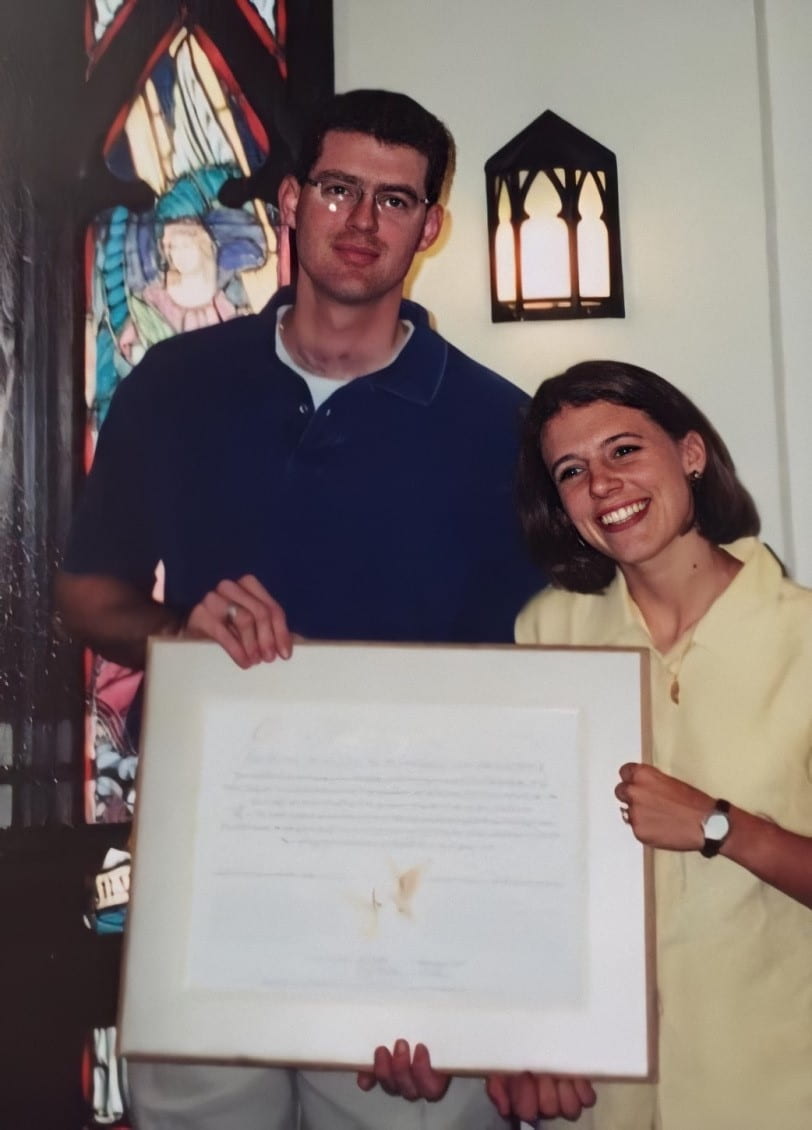
Jonathan and Elaine Daugherty have a wedding renewal April 8, 2000, at the church they were originally married in. They have three children and have been married for 24 years. Courtesy of Elaine Daugherty.
Components of Jonathan’s recovery included support groups, his local church and counseling. The road was arduous, but the Daugherty’s marriage was restored. Elaine forgave him, and they decided to use their pain for good in ministry.
MINISTRIES
Churches and ministries are finally addressing the issue of sexuality.
The Senior Pastor of Cross Church, which is based in Northwest Arkansas, has led a Family Matters series the past couple months. Nick Floyd preached specifically on sexuality April 1 via Facebook live. He said sex is exclusive, private, provides protection and is made for enjoyment.
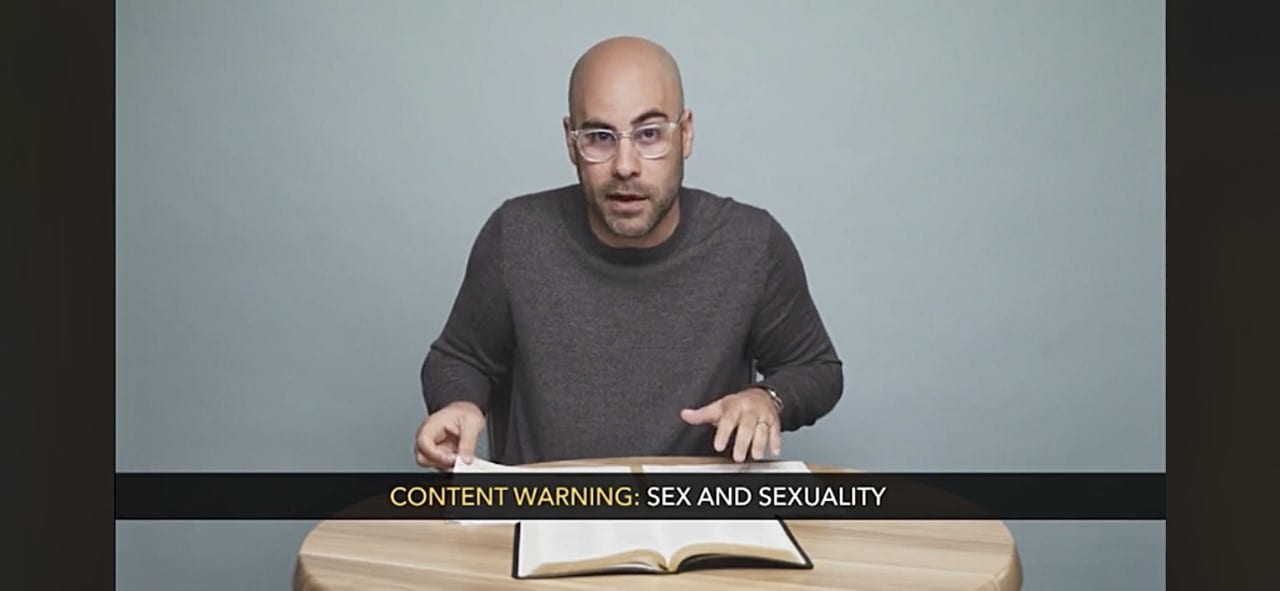 Nick Floyd, senior pastor at Cross Church, warns parents through Facebook live of the sermon topic in case they don’t want their kids listening. The video has over 2,200 views. Screenshot from the Cross Church Facebook page.
Nick Floyd, senior pastor at Cross Church, warns parents through Facebook live of the sermon topic in case they don’t want their kids listening. The video has over 2,200 views. Screenshot from the Cross Church Facebook page.
“The world speaks very openly about sex, and the church must speak openly about these matters,” Nick said during the video. “If you want to enjoy God’s gift to the fullest, you do it God’s way, within God’s boundaries [marriage].”
For those who have experienced a “hurt, hang-up, or habit,” Celebrate Recovery is a program focused on wholeness, growth and spiritual maturity. CR wants people freed from shame and pain. It has been used in over 30,000 churches and by 4 million people all over the world, including Emma. It allows people to find support teams, sponsors and more for multiple issues, like pornography, abuse and marital problems.
Emma’s participation in a CR step study through Fellowship and working through the book Rethinking Sexuality helped her find healing. She’s moved past pain to fiery passion. For a year into Emma’s marriage, she couldn’t even say the word sex out loud. Now she leads college women on the topic.
“We need to be having holistic conversations where everyone sees what the purpose of their sexuality is,” Emma said.
Emma thinks the conversation should be beyond sex. Sexuality doesn’t appear suddenly in marriage. What about new moms and their bodies? The elderly, disabled, LGBTQ, everybody?
“Everyone has sexual sin and we’re just leaving people in the dust,” Emma said. “I think with my children, the issue will be, ‘Do you feel seen and loved?’”
Joy questioned whether or not she was loved, but found her answer in Jesus. Her calling for helping women was revealed through the pain of sexual sin and abuse, which still occasionally affects Joy.
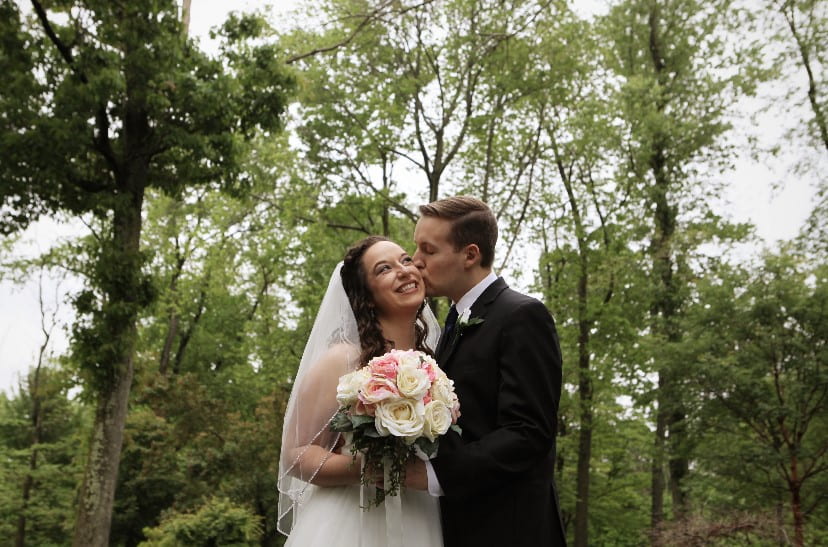
Joy and Zack Skarka’s wedding day in May 2017. They met at Dallas Theological Seminary and live in Florida. Courtesy of Joy Skarka.
“Different things will trigger me where I know my husband is being loving or not trying to hurt me at all,” Joy said, but “he’ll do something like push me down on the bed where he’s just trying to be fun and playful and I’ll have a flashback.”
Porn and romance movies distorted Joy’s view of sex, but the couple worked through her struggles and her husband’s inexperience. She used her story of sexual addiction and abuse to help other women find freedom. Since 2013, Joy has been praying to make her passion a full-time job. This year, she was hired as the director of discipleship for Authentic Intimacy.
“There’s still a long way to go for our churches, but there is hope and a lot of great ministries doing good work,” Joy said.
Jonathan created one of those ministries. About three years into their recovery, he felt tugged by God to share what he learned, so Jonathan started Be Broken.
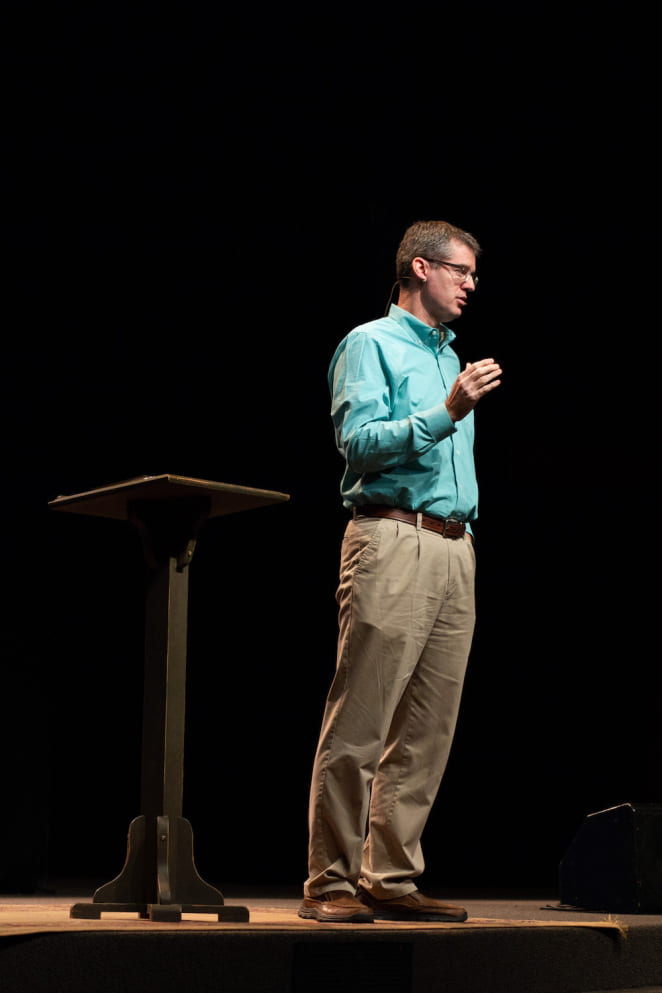
Jonathan Daugherty speaks at a church about sexuality. He is an author, the host of Pure Sex Radio (which reaches 100 countries) and has spoken about sexual purity on shows like Oprah and ABC’s Nightline. Courtesy of Jonathan Daugherty.
His life’s work is about helping churches and families grow in the area of sexuality. Although Christians are doing better, he thinks there needs to be more education to help tear down the barrier of an “us versus them” mentality.
“Everybody’s broken,” Jonathan said. “Everybody needs to learn more about how to respond well in this area of sexual brokenness.”
Because of Emma and Rethinking Sexuality, I have a better understanding of my relationship with God. I’m not so nervous to ask questions or bring up concerns about my relationship. Those nagging thoughts of guilt and shame are fleeting.
At first it felt strange to connect sexuality with Christianity. It seemed like something I wouldn’t have to deal with until marriage. And if I did anything wrong sexually, I was a terrible Christian. Now, I’m conscious of the culture’s distorted view of it in movies, books and TV shows. I know that everyone struggles with sexuality, and it doesn’t equal automatic condemnation. If I let the world define sexuality, it reframes my view of God and his design.
Jesus was a friend of sinners. An empathetic healer for the downtrodden and broken. In John 8:1-11, he saves a woman charged with adultery from being killed: “Let him who is without sin among you be the first to throw a stone at her.” Sin is sin, but we can do God’s work by talking about sexuality and educating people, not turning them away for mistakes. If the church is modeled after Christ, shouldn’t we all be more like him and approach these issues with truth AND love?